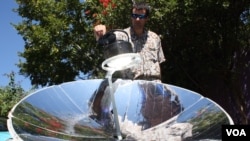South Africa is enduring an unprecedented power generation crisis. Electricity blackouts continue across the country as its power monopoly, Eskom, plunges deeper into chaos. Eskom acknowledges it failed to maintain important infrastructure for the past 20 years. As winter begins to bite, South Africa is bracing for widespread electricity outages, and demand for alternative sources of energy is spiking.
A diesel-driven generator powers a restaurant in Johannesburg. For the third day in a row, large parts of the city have no electricity.
The restaurant owner, Heidi Welman, spends hundreds of dollars a month on her generator to keep her business open. “It’s a real big pain in the butt,” she said.
Like millions of South Africans, Welman is angry at the Eskom power company's inability to keep the lights on.
“Then the biggest thing for me is: How can the CEO earn 22.8 million bucks [rands] a year but they don’t have money to fix their own [expletive bleeped out]?” she said.
Crosby Menzies started SunFire Solutions, a solar energy company, in his backyard in a Johannesburg suburb 10 years ago. At a time, he said, when a power generation crisis in South Africa was “unimaginable.”
The country had what was then regarded as one of the best-run electricity systems in the developing world.
Menzies said until recently harvesting power from the sun was regarded as the “domain of lunatic greenies.”
“We were very much viewed as strange people. We in fact had business analysts say that it was virtually impossible to run a company doing solar cooking in particular,” he recalled.
Solar cooking
But now, said Menzies, regular blackouts mean more South Africans are embracing his sun-charged products. Like his portable parabolic cooker.
Menzies’ colleague, Zander van Manen, described it as a “magnifying glass in reverse.”
“It has the bent lens, which is now actually a parabolic dish, which just concentrates the sunlight, concentrates it into a spot normally around 700 millimeters,” Van Manen explained.
The cooker looks like a big, shiny TV satellite dish.
“We keep them stored upside down,” Van Manen said, “because it concentrates sunlight it can be quite dangerous if left be; it’ll set things around it on fire.”
Van Manen turns the dish towards the sun. It is lined with aluminum tape which reflects light on a spot directly under a pot, which is secured to the dish by a metal stand. Soon, a stew is bubbling.
The sunlight is so hot that when Van Manen holds a piece of cardboard in its beam, it flames within seconds.
Menzies said 20 minutes of sunshine is more than enough for the solar dish to cook the average meal.
“That’s a clean cooking kit and we estimate that that could reduce your cooking energy needs by 80 percent straight off the bat,” he said.
Mini solar system
Menzies is also supplying what he calls a “mini solar home system.” It’s a miniature array of photovoltaic solar panels that charge a small battery when left in the sun for a while.
“So we’ve now probably got about six or seven brilliant lights that can really light up a house and people can do their homework with and we’ve got the same solar lantern - phone charger combination; some with radios, actually," he said. "It can charge tablets, it can charge smart phones; it can still charge three or four normal phones possibly in a day.”
Menzies said harnessing the sun’s power makes sense in a “sun-blessed” country.
He said many citizens also want to end their dependence on Eskom because of the rapidly rising costs. “We’re probably paying 350 percent more. We’ve gone from the cheapest energy in the world in 2008 to now having one of the most expensive,” he noted.
Menzies predicts that as South Africa’s electricity catastrophe peaks in years to come, many residents will invest in solar energy, the cost of which will become steadily cheaper.




